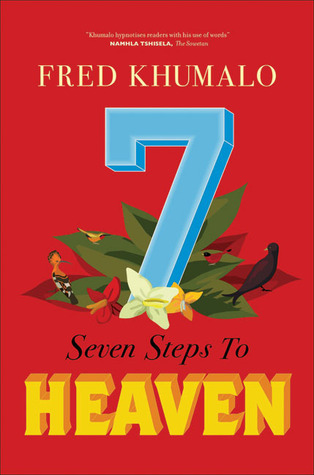

This is an unusual novel that I still can’t quite wrap my head around.
In the first part of the story, we follow Sizwe’s upbringing in a newly built black middle class neighbourhood and his escapades with his best friend Thulani. Their relationship is a throughline to the end of the book; Sizwe is insecure and jealous of his charming and talented friend, especially once both of the boys start writing stories and Thulani turns out to be the better writer.
Throughout the novel, there is an undercurrent of social commentary about race and class in the pre- and post-Apartheid South Africa. Thulani is a sharp observer of the respectability politics of his childhood neighbourhood, trying to prove its status, and of the dynamics at his newly desegregated university (“a white boy trying to be black, with a black girlfriend at pains to sound white”).
Bisexuality in Seven Steps to Heaven is “matter-of-fact”, “[without] guilt or angst”. Sizwe, whose relationships beforehand had all been with girls, gets his first boyfriend at university and ends up moving in with him as they are finishing their studies and starting their careers.
Year of publication:
2007
Country of publication:
South Africa
Page count:
209
Would I recommend this book?
I genuinely don't know???? Probably not?
It’s at this point in the book, in the last few chapters, that the narrative ramps up and transforms into something a lot more surreal.
Writing, both Sizwe and Thulani’s passion, is revealed to be a dangerous obsession that can undo a person. Their rivalry turns into madness and a loss of identity. The final chapters have the reader questioning what is real and what is a hallucination.
It's interesting to see the dynamics of an intense childhood friendship - the love, the jealousy, the merging of identities and the homoerotic undertones - taken to its extreme, but the shift in the narrative comes so late and unfolds so suddenly it’s dizzying, and Khumalo’s simplistic prose isn’t doing it any favours.
Another drawback is the novel’s treatment of its female characters - while Khumalo pays close attention to race, class, and national politics, sexism appears to be his blind spot. Female characters in Seven Steps to Heaven are either objects of desire or mothers (or both) and there are ample sexualised descriptions of their bodies (so many stolen glances up skirts, so many see through nightgowns and dresses worn without panties!). One might expect that a novel with a bisexual protagonist would afford its male characters the same lustful treatment, but that’s not the case.
Academics have praised him for depicting resourceful business women and female heads of families, but also noticed the contradiction with the fact that “Khumalo’s portrayal of black women is done in a rather perfunctory manner”.
All in all, my feelings about this book are very ambiguous. I admire Khumalo’s ambition with this narrative and as soon as I finished reading, I spent a long time researching academic interpretations of the novel to fully take in its different aspects. However, the execution doesn’t convince me and I found Khumalo’s descriptions of his female characters very distracting.

Note: The description on the back of the book is very deceptive, making it seem as though two side characters are actually at the centre of this book (possibly because they appeared in Khumalu’s debut novel and the publishers wanted to capitalise on its success?).
